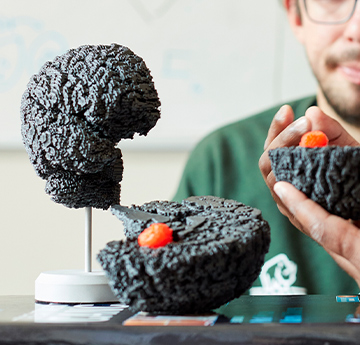Our research adopts a translational perspective with the aim of understanding problems that are of social importance to inform subsequent policy debate and produce behaviour change. We aim to gain empirical insight into complex psychological processes before extrapolating our findings to significant social challenges. Our emphasis on research pathways from the lab to the real world allows us to create models and analyses which inform the development of assessment and intervention techniques for wide-scale use.
100% of our Psychology Research is Internationally Excellent for Impact
REF2021

Psychology Research Highlights
Research within the School of Psychology aims to have an impact with the treatment of common physical and mental health conditions. The school's themes have been key to our translation impact, improving outcomes for patients, populations and insights for medical and public health professionals.
Our understanding of psychological processes and our thriving research community based around two broad research themes, has led to us being a hub for interdisciplinary research excellence supported by our physical proximity to key partners in Health, Life Science and Medicine. We gain empirical understanding for societal and policy impact in areas ranging from obesity and nutrition, gambling and behavioural addiction, forensic and clinical psychology, neuroimaging and cognition.
Improving Outcome Assessment in Acquired Brain Injury
Over 1.3million people in the UK are living with the long-term effects of acquired brain injury (ABI). ABI is an injury to the brain which has occurred since birth whether a road traffic incident or a fall or stroke. This research aimed to ensure that health professionals have the tools to reliably detect neurobehavioural disability. This tool (The St Andrew's - Swansea Neurobehavioral Outcome Scale) has seen wide spread national and international adoption and is now emended into electronic patient record systems.
Improving Psychological Support for Health Related Stress
Venous Thromboembolism (VTE) is defined by fatal or potentially fatal blood clots through the body. The experience of a VTE has the hallmarks of an event likely to cause significant psychological distress. This research was approach in two distinct strands, the first focussing on identifying the scope of the problem the second examining the psychological impacts of VTE. Professor Bennett's work has been recognised as needing to be central to developing standards of care for VTE patients, and healthboards have implemented psychological provision for patients as a direct result of this research.
Psychological Support to Promote Physiotherapy for Pelvic Floor Dysfunction
Pelvic Floor Dysfunction (PFD) affects 25% of women Worldwide. Physiotherapy Pelvic Floor Muscle Training (PFMT) is an effective, safe, and cost efficient treatment, yet many women do not attend or complete their sessions. Professor Reed found that 50% PFD sufferers were not attending for treatment. Patients who also had depression and anxiety (around 30% of this patient group) were even more likely not to complete treatment, and would have poorer PFMT outcomes even after the had completed treatment.

Gambling Harmless Fun?
Gambling (which may be defined as wagering on an uncertain outcome, usually for money) is as old as time itself. While most people can enjoy an occasional bet on the football or a trip to the casino without developing a problem, a significant minority find it difficult to limit their gambling.
Our research aims to identify those who may be at risk of gambling related harm, to investigate the neuro-behavioural mechanisms underlying the onset and maintenance of gambling problems, and to develop innovative forms of clinical treatment. We adopt a basic-applied translational perspective in which gambling problems or specific features of gambling games are modelled experimentally in the basic science lab before translational application to real world gambling.

Anxiety and Avoidance: Safe from Harm?
Learning about what does and does not predict threat clearly aids our survival. Confronted with new situations, experience with similar threats guides us. People vulnerable to anxiety may, however, come to overly rely on just one unpleasant experience when reacting to different situations.
‘Living in fear’ prevents disconfirming opportunities; rather than wait and find out if something bad will happen, we opt for a “better safe than sorry” approach. As a result, our quality of life is impaired and mental health suffers. Overcoming this avoidance tendency is a common feature of behavioural therapy and is a core characteristic of disorders such as anxiety related disorders, obsessive compulsive disorders, and PTSD.
Join Our Research Community
The research work we do is in support of an ethos underpinned by a culture of connectedness from the research we carry out through to the opportunities we build for early career researchers. Our research has worldwide impact and is an ideal platform from which to launch a research career. Integral throughout all of this is the involvement of patients and care providers in our work, ensuring it remains relevant to the challenges facing our society.
Our research degree programmes will help you to; pursue a career in academia, improve your employment prospects, develop your skills in a chosen professional career or simply want to follow a programme of research based on your own personal interests.




